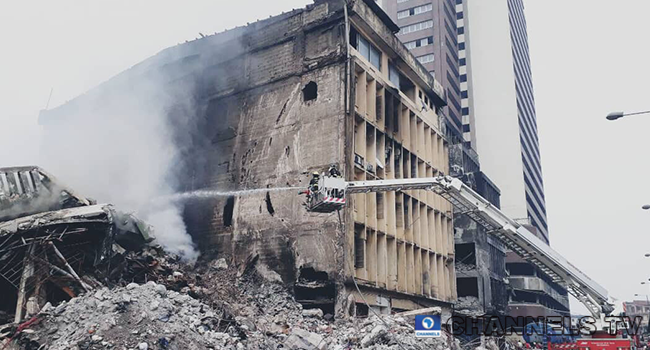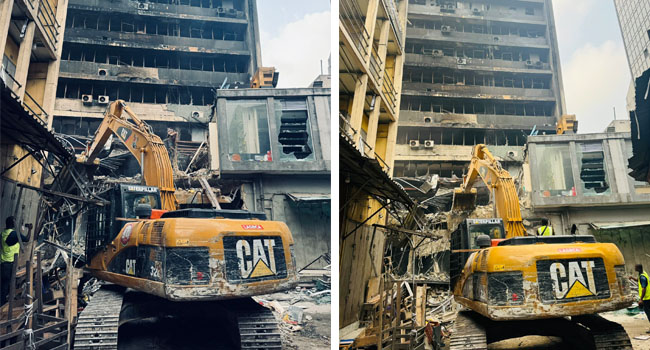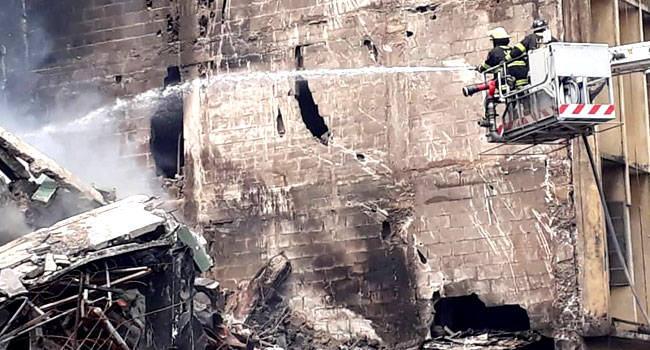
A fire scene defines disarray – the thick, black smoke and flames shooting up from buildings, fire-trucks and busy firefighters engaging the inferno, trying to keep the flames from spreading. The tension is always as thick as the smoke, and a dark mood hovers.
Balogun market, on Martins street, where at least two fire incidents have been recorded in the space of two months, now looks like a mini-war zone with the blaze leaving a mark of abandonment, mountainous rubble, collapse and different degrees of damage.
During the last fire incident, on January 29, many traders watched buildings go down with their goods in them. Some made frantic efforts to salvage as many goods as they could in adjoining buildings. They threw well-wrapped cartons down, hurriedly moving them to a different location.
Now that the flames are gone and the dust has settled, the attention has again shifted from the market, but how are the traders faring? What are the current efforts of the government and its agencies to clean up and maintain safety measures in the market?
Channels TV, recently, went back to the market.
The generator problem
During the last fire at the market, at least seven buildings were affected. The cause was rumoured to be a result of a generator accident. However, when we visited, the generators remained a ubiquitous sight.

A 30KVA generator, which weighs up to 1,500 kilograms, sat on a suspended floor. The roaring machines are a common sight at the clustered and congested market where space remains a high-priced merchandise.
As unattractive and scary as a hung generator may look to everyone visiting the popular wholesale market, it is somewhat a sign of success among traders. Not every trader can afford to buy one of these heavy equipment, let alone place it that high.
The Lagos state Governor, Babajide Sanwoolu during his visit to the market in November, decried the attitude of the traders to safety regulations. He said the generators must be brought down, but as at our last check many of the buildings still have the generators on suspended floors.
The Lagos State Emergency Management Agency (LASEMA) confirmed that the blaze that destroyed some buildings in November last year started from a generator. A similar cause was cited when nine buildings were razed earlier in the month.
According to the LASEMA boss, Dr Femi Oke-Osanyintolu, a trader tried to refuel an active generator; it caught fire and spurned an inferno that lasted for hours.
A conspiracy theory
The generator as the main fire trigger is a popular story around the market but there are other accounts brewing from suspicion. Some traders suspect arson. There are allegations that the fire incidents are not mere coincidence, but the work of a government agency involved in sabotage.
A trader at the market, Anedu St. Michael said the Central Business District (CBD), an agency of the state government, is taking advantage of the market’s merchants.

“They have turned this place to an ATM machine, they come here on a weekly basis, like for example here on Christmas period, we settled them with not less than N200,000,” he said. “This January they came again to tell us that the money we paid them has expired, that we have to contribute another N300,000 to give them. I begin to suspect that CBD is behind these fire incidents.”
However, the men of the CBD denied these allegations, they say they are only doing their job. As part of their operation of sanitizing and promoting orderliness, they go into the market clearing and seizing goods under distressed buildings where traders use as make-shift shops to spread their merchandise.
It stays the same
Everything at the market still points to the lack of safety – large amounts of flammable materials are stored in the buildings, generators are suspended on floors, vehicular access into the market is very difficult owing to congestion, a reason firefighters have cited among the challenges of putting out fires when they break out in the market.

The Director-General Lagos State Safety Commission (LASSC), Lanre Mojola, during the post-incident investigation said they have identified some cracked buildings and sealed them up for safety purposes. They have, but getting the traders to keep a safe distance from the buildings is a different matter altogether – scavengers are seen in partially collapsed buildings trying to profit from the rubble.
LASEMA had also promised to conduct an integrity test on the affected buildings and pull down the unfit ones to avert another danger at the market but the buildings, the ones affected by the fire, are left standing while people carry on with their usual activities.
Meanwhile, the Lagos state government says it is planning a total regeneration of Lagos Island, a move it hopes will solve the recurring problems of building collapse and fire outbreak.

During his last visit to the market, Governor Sanwo-Olu admitted that there are buildings standing idly that could endanger the lives of the people. “We also have abandoned high-rise buildings on the Island and we have done audit of all these buildings,” he said, “we need to have a conversation with the owners on how we can put the abandoned property to better use.”
One of those buildings is the ‘Great Nigeria House’. It is one of the tallest in Nigeria; it once housed a bank and also serves as warehouses to some traders. A 2013 inferno got the best part of the building leaving it condemned and unsafe.
While Balogun market, known for its wide selection of colourful Nigerian fabrics, still attracts a lot of people, despite the loss of goods worth millions of Naira, the post-incident action of appropriate authorities is not only needed to keep the market and the traders in business but to also guarantee the protection of lives and property.
It must happen and it must be fast.




